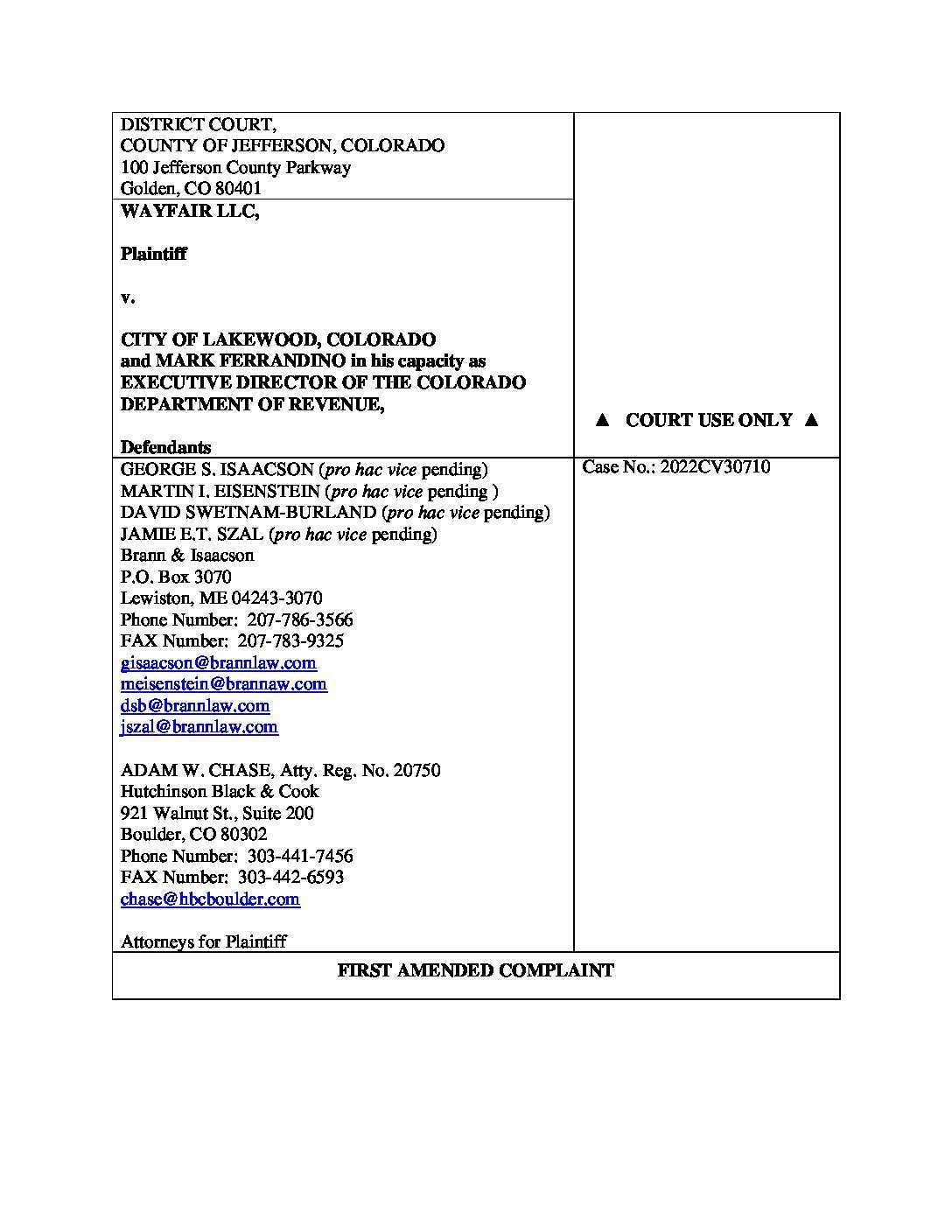Summary: Wayfair has sued Lakewood, Colorado over its complex sales tax reporting requirements, which may spell trouble for the state in the future.
Wayfair LLC, the online furniture retailer famous for its role in the landmark South Dakota v. Wayfair, Inc. Supreme Court ruling, has sued Lakewood, Colorado, over its complex sales tax reporting requirements. Wayfair alleges that during the period from 2018 to 2021, Lakewood’s decentralized sales tax system unconstitutionally violated the company’s right to engage in interstate commerce, which would be a direct violation of the Commerce Clause of the United States.
Header image generated by Midjourney AI.
Background
In 2018, the South Dakota v. Wayfair, Inc. case eliminated the physical presence standard for online sellers and upheld South Dakota’s economic nexus thresholds. Shortly after the case was ruled in South Dakota’s favor, states rushed to pass economic nexus laws that similarly taxed remote sellers. Today, every state with a sales tax requirement has some form of economic nexus law signed into law.
One thing that was discussed at length during the South Dakota v. Wayfair case was that South Dakota had particular safeguards to protect against onerous sales tax filing complexity. In fact, South Dakota’s membership in the Streamlined Sales Tax (SST) project was discussed at length in the ruling. Colorado is not currently an SST member state.
Colorado’s sales tax reporting requirements are more complex than just about any other state’s due to the fact that about half of Colorado’s cities are “home rule” cities which oftentimes require separate sales tax permits, and sales tax filings, in each local jurisdiction. This means that online retailers who have sales tax nexus in Colorado could be subject to filing hundreds of pages of sales tax returns each month in order to stay compliant.
Colorado has attempted to simplify its sales tax system by rolling out a centralized Sales and Use Tax System (SUTS) to allow a single place where sales tax returns can be filed for Colorado’s 70-plus home rule localities. However, home rule jurisdictions are not required to participate. The system does simplify the sales tax remittance process in Colorado dramatically. However, unless all Colorado home rule localities are forced to participate, it potentially creates a third layer of complexity since paying sales tax can take place in one of three places: directly with the home rule, directly with the State of Colorado, or within the SUTS system. The SUTS system was not available during for the periods of the complaint.
Wayfair’s Lakewood Complaint
Wayfair’s Colorado lawsuit creates two arguments claiming that Lakewood’s taxes imposed from 2018 to 2021 are unconstitutional. Both center around the question of impeding interstate commerce, which would be a direct violation of the Commerce Clause of the United States Constitution.
Wayfair’s first argument is that neither Lakewood nor the Colorado Department of Revenue adequately installed safeguards protecting remote sellers from Colorado’s overly complex sales tax scheme. Those steps could have included creating a single statewide sales tax remittance system, or access to software that would protect against sales tax audit exposure.
Wayfair’s second argument is that within the city’s Belmar district, the city improperly assessed tax. Sales inside the Belmar district from out-of-state sellers were subject to Lakewood’s 3% sales tax, while sales within the district were reduced to a 1% sales tax rate, but they were also subject to a 2.5% public improvement fee. Historically, sales tax rates that are higher for out-of-state businesses have been struck down due to creating an undue burden on interstate commerce. It is not clear on its face, though, whether or not a 3% sales tax is materially different from a 1% sales tax combined with a 2.% fee.

What Happens if Wayfair is Successful in Colorado?
If Wayfair is successful in its case against Lakewood, Colorado it may do three important things:
First, it may create protections for businesses who have been audited by home rule localities for periods when they were not a part of Colorado’s new SUTS system. This means that businesses who are, or were, under audit prior to SUTS membership may be protected from paying assessed tax that wasn’t already collected from customers.
Second, it may push Colorado to force all home rule localities to participate in their SUTS system moving forward. However, there may be legal challenges in forcing home rule localities to participate without amending its constitution. Home rule localities generally have wide latitude in determining how to administer their sales tax.
Third, it may be a signal to other states that have complex sales tax systems that they need to simplify their reporting requirements, or they may be similarly struck down. This is important in states like Alaska, Alabama, and Louisiana.
Get in Touch
Company
Disclaimer: Nothing on this page should be considered tax or legal advice. Information provided on this page is general in nature and is provided without warranty.
Copyright TaxValet 2023 | Privacy Policy | Site Map

Disclaimer: Our attorney wanted you to know that no financial, tax, legal advice or opinion is given through this post. All information provided is general in nature and may not apply to your specific situation and is intended for informational and educational purposes only. Information is provided “as is” and without warranty.
What you should do now
- Get a Free Sales Tax Plan and see how Tax Valet can help solve your sales tax challenges.
- Read more articles in our blog.
- If you know someone who’d enjoy this article, share it with them via Facebook, Twitter, LinkedIn, or email.
